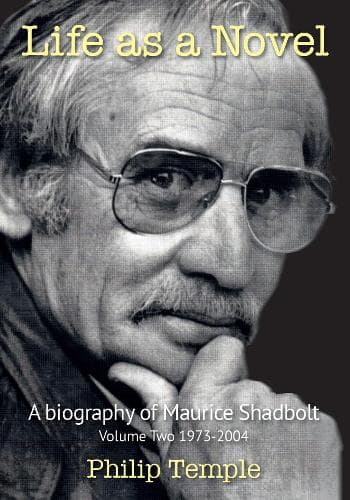Review: Life as a Novel (A biography of Maurice Shadbolt, Volume Two 1973-2004)
Reviewed by David Hill
In Tessa Duder's essay on pioneering NZ children's author Esther Glen, there's a sentence which has always unsettled me: “She lived long enough to see her books go out of fashion”.
The wind shifts of public taste and literary trends haunt every writer, and as Philip Temple acknowledges in the second half of his diptych on the life of Maurice Shadbolt, they've eroded his subject's standing. The big-chested male protagonists and declamatory, sometimes florid prose can seem passe against this century's edgier fiction and morphing values.
Yet Shadbolt deserves respect and re-evaluation. The two volumes and 700 pages of this biography provide those admirably. It’s a story that might have become repetitive. Shadbolt's life could be seen as one book after another, along with one woman after another. But Temple evokes the changing rhythms, individual variations, overarching aims within and without the cycles.
So, what do we learn of the novelist / short story writer / journalist / playwright in Vol 2, which begins when its subject was 40 and ends after his final distressing, demented decade?
It was a life “sardined with women”, to use Dylan Thomas's phrase. His first marriage to Gill was behind him; his second to TV host Barbara Magner was lurching to a finish. Actress Bridget Armstrong and writer Elspeth Sandys were to become Wives Three and Four. (The engagement notice to Armstrong appeared on the same newspaper page as a crossword where answers included “immodesty” and “shamelessness”. That's one of numerous satisfyingly subversive notes in Temple's narrative.)
There were other affairs and liaisons. Shadbolt was indifferent towards his partners' emotional and domestic needs; envious if their professional lives threatened to shade his. Temple suggests he was a product of the times: “the entitled artist as hero”; sees him as always seeking a woman who would be muse, lover, support, mother, protector. He was a cad and a bounder but his ex-partners often forgave him; helped during his miserable final years.
He could be a rewarding friend; gave money to needy acquaintances, even while protesting he was too poor to pay maintenance to ex-wives and children. (Temple mischievously records the “creative non-fiction” of his correspondence with the IRD.) Yet he “could change his friends each time he changed his women”.
He was engaged with the world – sailed into the Pacific to protest French nuclear testing; marched against the 1981 Springbok Tour; became active in the cases of Bill Sutch and Arthur Alan Thomas; worked to dispel cosy myths about the Gallipoli disaster. Such issues sometimes became scripts or stage productions (Once on Chunuk Bair, where the author surreally picketed his own opening night after disagreements with director Ian Mune), or one of his 9000-word Reader's Digest articles.
And always he wrote his fiction, struggling and exulting, grumbling and persisting. The titles, awards, overseas editions mounted: Danger Zone, Season of the Jew, Strangers and Journeys, Monday's Warriors, along with the searching, mythopoeic memoir, One of Ben's. Temple provides succinct appraisals of each.
He was successful, acclaimed, attacked – feuds with Sargeson and Michael King flicker and spark throughout. Eventually, he was to suffer from “the sin of popularity”.
The title? Michael King wrote in a review of One of Ben's that it “felt like a Shadbolt novel, and Shadbolt himself was one of the characters”. You often feel he's there in his fiction, too – and that his own life story resembles one of his more purple plots.
The biography overall? Meticulous, measured, compassionate. Seven years in the making. Temple has been writing for (gulp) six decades, and like his protagonist, he's a consummate storyteller. I'll now damn his chances by predicting you'll see this book in next year's Ockhams.
Reviewed by David Hill
David Hill's YA novel Coastwatchers (Penguin Random House) and his story collection for children, Three Scoops (OneTree House), were published in 2001.
